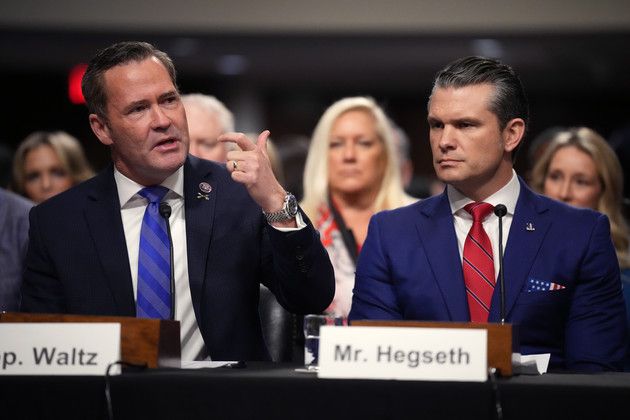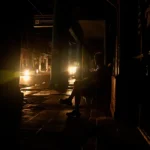
The magazine said it has decided that “there is a clear public interest in publicizing” the information.
On Wednesday, Atlantic released messages of messages sent among senior Trump government officials through the signing encrypted application, detailing the moment and weapons used in air attacks against Iran’s Humhi militant group in Yemen, arguing that the interpretation of the White House justified as complete dissemination as possible.
In an article published on Wednesday, the magazine said it has decided that “there is a clear public interest in publicizing the type of information that Trump’s advisers included in non-safe communication channels, especially since important management figures are trying to minimize the importance of messages that have been shared.”
Since The Atlantic first reported on Monday that high government officials, including Vice President JD Vance, Defense Secretary Pete Hegseth and National Security Counselor Mike Waltz, were using a signal chat to discuss the attack in early March, President Donald Trump and others attacked the credibility of the magazine editor-in-chief, Jeffrey Goldberg, who was added by mistake the group’s chat and saw its content sent in real time. They also claimed that neither “war plans” nor confidential information was shared on the chat.
Not all messages were released – the magazine chose not to disclose the name of a CIA intelligence officer who served as CIA director’s chief of staff John Ratcliffe – but The Atlantic published most of them in the form of image. Messages show detailed information about the types of aircraft used to attack Hethis militants and the attack schedule. They also show raw opinions of Trump administration’s high government officials about the strategic benefits of attacking Houthis and supporting European trade.
In a message, Hegseth, who repeatedly denied irregularities and attacked Goldberg for his reports, described that F-18S and Drones would launch an attack from 2:10 pm and offered specific information about the types of missiles that would be released. He also described the rhythm of the attack. Like Goldberg and reporter Shane Harris of The Atlantic wrote on Wednesday, the specificity of the message could have endangered the safety of US pilots if it had fallen into the wrong hands.
“If this text had been received by someone hostile to American interests – or someone merely indiscreet, and with access to social media – the Houthis would have had time to prepare for what should be a surprise attack on their strongholds,” they wrote. “The consequences for US pilots could have been catastrophic.”
In another message, Waltz said the air strike apparently took the “missile face” of the Houthis. Waltz also said in another text that there was “multiple positive identifications,” which suggests that US intelligence used human or technicians to identify Hethis targets in Yemen.
CIA director John Ratcliffe and National Intelligence Director Tulsi Gabbard were questioned by legislators at a hearing on Tuesday against members of the Senate Intelligence Committee. In his statement, Gabbard said he could not remember whether the specific time or the weapons systems were mentioned in the signal chat.
For his part, Waltz wrote in X on Wednesday: “No place. No source and method. No war plan. Foreign partners had already been notified that the attacks were imminent. Conclusion: President Trump is protecting America and our interests.”
Senate Intelligence Committee Chairman Tom Cotton (R-Aark) added that The Atlantic report is exaggerating the importance of messages, calling the conversation as a “war plans” of “beautification and exaggeration by known leftist party opponents of the president.”
“What I think is most important here is not the way this information was communicated, but the actions that were taken to really attack the rebels,” continued Cotton.
It is not clear how the White House will proceed from now on. While White House Secretary Karoline Leavitt and the Taylor Budowich Cabinet’s deputy chief, as well as the Pentagon’s rapid response account, focused on The Atlantic’s decision to exchange “war plans” for the title of his follow-up piece, the content of the messages will likely feed more public scrutiny. Republicans in the Senate Armed Services Committee said on Tuesday that they would investigate how this information was shared, and the disclosure of additional screen captures can add more pressure on Waltz and Hegseth, which face future uncertain to an allergic leaks administration.
The latest revelations about government authorities discussing military operations outside the government’s secure channels will likely intensify the appeals for Hegseth to face the consequences.
Senator Mark Kelly (D-Air.) Said the newly published screen captures of the Houthi attack texts make it clear that the Pentagon head should resign.
“The signal incident is what happens when you have the most disqualified secretary of defense we’ve ever seen,” Kelly posted at X. “We’re lucky that no military life has cost, but for the safety of our military and our country, Secretary Hegseth needs to resign.”
Several important democrats have already required Hegseth and other national security leaders to renounce or that Trump dismisses them-including the leader of the House, Hakeem Jeffries, and leader Katherine Clark, Senate Intelligence Committee Vice President Mark Warner (D-VA.), Senator Tammy Duckworth (D -ill.) Deputy Don Beyer (D-VA.).
Senate minority leader Chuck Schumer did not even ask for resignation from Hegseth or other high employees in a plenary speech on Wednesday, but asked Trump to provide congress on the unauthorized signal chat, including messages sent after Goldberg left the channel. He said that “many pending questions were simply not answered” by the latest Atlantic report.
“It’s scary,” said Schumer. “Worst of all, confirms our darker assumptions about the incorrect management of sensitive military operations.”
“What is the administration hiding by not disclosing the full and complete transcription of this chain of text?” Schumer continued. “If no confidential information has been shared, the administration should have no problems with the complete transcription being shared with the senators.”
Deputy Don Bacon (R-Neb.) Emitted some of the hardest criticism of Hill’s Republicans. Nebraska’s Republican is part of the armed services committee and is a former US Air Force officer.
“The White House denies that this is not a confidential or sensitive data,” said Bacon. “They should simply assume this and preserve credibility.”
Originally published by the politician on 03/26/2025
Por Eric Bazail-Eimil
Connor O’Brien, Meredith Lee Hill and Ben Jacobs contributed to this report.
Source: https://www.ocafezinho.com/2025/03/29/o-atlantico-divulga-capturas-de-tela-de-tempo-e-armas-usadas-nos-planos-de-guerra-do-iemen/

